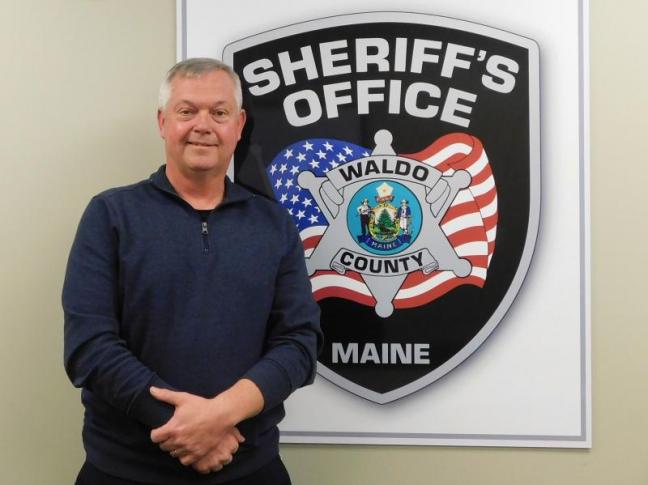Waldo County Sheriff works to reduce department risks of COVID-19
BELFAST — Three members of the Waldo County Sheriff’s Office, including Sheriff Jeffrey Trafton, have undergone precautionary quarantines in an effort to ensure the department remains safe and functional during the COVID-19 outbreak.
While Trafton’s since-ended quarantine was the result of a family member feeling unwell, two members of the department are still completing their 14-day quarantine after returning from out of state vacations.
As Maine grapples with the potentially deadly virus that currently besieges much of the world, members of the small agency are also working to ensure their interactions with the public and each other are done safely.
One step Trafton has taken is having his deputies and department members come into the office as seldom as possible, and remaining six feet apart from one another when they do.
“The deputies have all their equipment in their cruisers, they have internet access and access to our police reporting database right from their cars, so they’re coming into the office as little as possible and working from their cars and their homes. The same is true for detectives,” Trafton said, explaining that he keeps a detective in the office during the day.
“We have three detectives, and we have one who comes into the office during the day because we get a lot of walk-in traffic for detectives. They also have the same laptop capabilities, so they can work from their cars,” he said.
Changes are also being made to how troopers perform their day to day routines. Though deputies are still responding to all calls for service, Trafton said that unless the person or persons present a safety risk, they are unlikely to be stopped or detained.
“Unless it’s a safety issue we’re advising the deputies to make as few traffic stops as possible.... Again, because I need those deputies to be safe and not sick, so we’re trying to limit their contact with the public, basically just like everyone else,” he said.
“If there is a pending problem or traffic safety problem they’re handling it, but other than that we’re asking them to limit their contact with the public, limit their traffic stops, then if they, in their normal operations, if they have to make an arrest, then they are.”
Trafton explained that while some infractions require incarceration due to safety concerns, for many other nonviolent infractions where law enforcement officers have the ability to use their own discretion to determine whether to arrest a person or simply write them a summons and let them be on their way.
“Unless it’s a violent crime we’ve asked them to use their discretion and write a summons and not bring them into the jail. Again, just to protect staff at the jail, protect residents of the [Maine Coastal Regional Reentry Center], because it’s all the same building and we’re trying to keep our jail population to a minimum,” Trafton explained. “If we get a case of coronavirus in that jail, in the Reentry Center, in the holding facility, we’re going to be in trouble.”
For this reason, Trafton said at this time new residents to the Reentry Center program are not being accepted.
While limiting physical contact can be challenging when making an arrest, Trafton said that personal protective equipment has been distributed to deputies, who are asked to use their PPE at their own discretion.
“I’m leaving it up to the deputies, if they want to wear rubber gloves, that’s up to them. We’ve provided them with rubber gloves. We have a limited number of what we call N95 masks - when this all started we only had on hand probably 120 of those,” Trafton said. The WSO has ordered more N95 masks through additional vendors but has yet to receive additional supplies.
Offenders who are being stopped by law enforcement may find the officer standing further from their vehicle, or wearing gloves or a mask.
The concern over the WSO’s stock of PPE is something Trafton said he’s never had to deal with before in his time as sheriff.
“This is unchartered water for all of us, I mean I’ve been in law enforcement for 36 years and I’ve never seen anything like this so, we’re just not equipped for stuff like this. When this all started to happen I took inventory of all of our PPE,” Trafton said, adding that while they had more than they would need in normal times, these are not normal times.
Working to minimize the new inmates added to the jail population is one way Sheriff Trafton is trying to keep the jail population lower, though it is not the only method.
Like many other states and counties around the country, Sheriff Trafton is also reviewing files of those currently incarcerated who may be eligible to be released early.
“There’s a state guideline, sheriffs have the authority to release people for various reasons; you can release them for medical furloughs, you can release them for hardships, they’re called Title 30 releases,” Trafton said. A form is available to inmates who meet the requirements for early release.
Some of those guidelines include that an inmate has served at least one-third of their sentence before they’re eligible for release, excluding anyone incarcerated for a violent crime.
“We have made some releases, some early releases, to try and minimize their exposure and to minimize our exposure,” Trafton said, adding that “sheriffs are doing that all across the state.”
Trafton acknowledged that the public is likely to be unhappy with the idea of prisoners being released before their entire sentences have been served, but said the decision was made in an effort to minimize the impact of the virus.
With widespread uncertainty throughout his community, Trafton said he wants the public to know that the WSO is still providing complete police services.
“If it’s a relatively minor call, and I say that reluctantly because when someone calls the police, in their mind, it’s not minor, but in relation to the whole big picture; a property line dispute with their neighbor is a different priority than a domestic violence situation,” he said. “We have to prioritize calls.”
When there is a way for deputies to handle a complaint over the phone, for instance mediating an argument between neighbors over property lines disputes, Trafton said he has asked his deputies to do so.
Trafton said this is true for sheriffs across the state, including the Maine State Police.
“If it’s a case where a deputy has to respond to the scene that’s exactly what we’re going to do,” Trafton added.
In addition to keeping the department healthy for the well being of the employees themselves, there is also concern over the insidious nature of the virus.
“I could start losing staff at any time to the virus and so we’re taking these precautions so that we can continue to provide law enforcement services. We’re a pretty small staff so I don’t have to have too many people get sick before we are critically impacted,” Trafton said.
In the event of an outbreak at the WSO, Trafton said there are contingency plans in place that will work to mitigate the missing coverage. The sheriff’s office is backed by the Maine State Police, who in turn are backed by the WSO.
“The first call that I’d be making if someone tested positive who had contact with three or four of my deputies, the call that I’d be making is to the State Police Commander [Patrick] Hood and ask for backup, Trafton said, “and of course if he had the same thing happen with his folks, we’re going to do the same thing. We’re going to fill in the blanks as best as we can.”
Erica Thoms can be reached at news@penbaypilot.com
Event Date
Address
United States





























